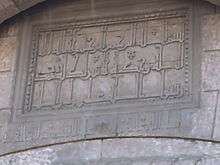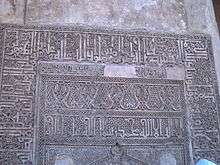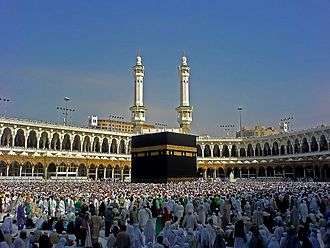Adhan
| Part of a series on |
| Islam |
|---|
 |
|
The adhan, athan, or azaan (Arabic: أَذَان [ʔaˈðaːn]) (also called in Turkish: Ezan)[1] is the Islamic call to worship, recited by the muezzin at prescribed times of the day. The root of the word is ʾadhina أَذِنَ meaning "to listen, to hear, be informed about". Another derivative of this word is ʾudhun (أُذُن), meaning "ear".
Adhan is called out by a muezzin from the mosque five times a day, traditionally from the minaret, summoning Muslims for mandatory (fard) worship (salat). A second call, known as iqama, (set up) then summons Muslims to line up for the beginning of the prayers. The main purpose behind the multiple loud pronouncements of adhan in every mosque is to make available to everyone an easily intelligible summary of Islamic belief. In modern times, loudspeakers have been installed on minarets for this purpose.
The adhan recites the Takbir (God is great)[2] followed by the Shahada (There is no god but God, Muhammad is the messenger of God).[3] This statement of faith, called the Kalimah, is the first of the Five Pillars of Islam.
| Adhan | |
| Arabic | أَذَان |
|---|---|
| Romanization | aḏān, azaan, adhaan |
| Literal meaning | call to prayer |
Muezzin
The muezzin (Arabic: مُؤَذِّن mu'aḏḏin)–is the person who recites the adhan[4]:470 from the mosque. Typically in modern times, this is done using a microphone: a recitation that is consequently broadcast to the speakers usually mounted on the higher part of the mosque's minarets, thus calling those nearby to prayer. The message can also be recorded, as is the case for London Central Mosque.
The muezzin is chosen for his talent and ability in reciting the adhan beautifully, melodiously and loudly for all Muslims to hear. This is one of the important duties in the mosque, as his companions and community rely on him in his call for Muslims to come to pray in congregation. The Imam leads the prayer five times a day. The first muezzin in Islam was Bilal Ibn Rabah, a freed slave from Abyssinia in Africa.[5]
Text
| Recital | Arabic | Transliteration | Translation | ||
|---|---|---|---|---|---|
| By Sunni [6][7][8][9] |
By Shi'a [8][9][10] |
By Zaidiyyah | |||
| 4x | 4x | 8x or 4x[lower-alpha 1] | ٱللهُ أَكْبَر | Allāhu ʾakbar | God is the greatest. |
| 2x | 2x | 2x | أَشْهَدُ أَنْ لَا إِلٰهَ إِلَّا ٱلله | ʾašhadu ʾan lā ʾilāha ʾillā Llāh | I acknowledge that there is no deity but God. |
| 2x | 2x | 2x | أَشْهَدُ أَنَّ مُحَمَّدًا رَسُولُ ٱلله | ʾašhadu ʾanna Muḥammadan rasūlu Llāh | I acknowledge that Muhammad is the Messenger of God. |
| None | 2x[lower-alpha 2] | None | أَشْهَدُ أَنَّ عَلِيًّا وَلِي ٱلله | ʾašhadu ʾanna ʿaliyyan walī Llāh | I testify that Ali is the viceregent (wali) of God. |
| 2x | 2x | 2x | حَيَّ عَلَى ٱلصَّلَاة | Ḥayya ʿalā ṣ-ṣalāh | Hasten to the prayer (Salah). |
| 2x | 2x | 2x | حَيَّ عَلَى ٱلْفَلَاح | Ḥayya ʿalā l-falāḥ | Hasten to the salvation. |
| 2x for Fajr prayer only[lower-alpha 3] |
None | None | الصلاة خير من النوم | aṣ-Ṣalātu kḫayrun mina n-naum | Prayer is better than sleep. |
| 2x | 2x | 2x | ٱللهُ أَكْبَر | Allāhu ʾakbar | God is greatest. |
| 1x | 2x | 1x | لَا إِلٰهَ إِلَّا ٱلله | Lā ʾilāha ʾillā Llāh | There is no deity but God. |
- ↑ Traditionally 4x.[11] Followers of the Maliki madh'hab also repeat this line four times.
- ↑ According to Usuli Twelver Shi'a scholars, this phrase is not a part of adhan and iqamah, but is recommended (Mustahabb). Akhbari Shia Twelver, however, consider as an integral part of adhan and iqamah.[12] Fatimid, Ismaili, Alavi Bohras and Dawoodi Bohra believe and include and recite this at same place, twice in main adhan, but not in Iqama. They also recite mohammadun -va- ali-un khayr-ul- basar va itarat-o- homa khayr-ul-itar (Muhammad and Ali are the best gentleman and their progeny is the best of progeny) twice after the 6th part (Ḥayya ʿala-khayr il-ʿamal). This tradition is continued from their first Da'i al-Mutlaq, Zoeb bin Moosa (1132 CE), after their 21st Imam, At-Tayyib Abi l-Qasim, and claim this is true Fatimid tradition.[13][14][15]
- ↑ Followers of the Maliki madh'hab say this line twice and repeat the following two lines before line four, as noted in Sahih Muslim, Book 4, Ch. 2, No. 0740.
Views
Sunni view
Sunnis state that the adhan was not written or said by the Islamic prophet, Muhammad, but by one of his Sahabah (his companions). Umar, a prominent sahabi of Muhammad, had a vision in his dream, in which the call for prayers was revealed to him by God. He later related this to his companions. Meanwhile, this news reached Muhammad, and he liked it and confirmed it. Because of his stunning voice Muhammad chose a freed Habeshan slave by the name of Bilal ibn Rabah al-Habashi to make the call for prayers. Muhammad preferred the call better than the use of bells (as used by the Christians) and horns (as by the Jews).[8][9][16]
During the Friday prayer (Salat Al Jumu'ah), there is one adhan but some Sunni Muslims increase it to two adhans; the first is to call the people to the mosque, the second is said before the Imam begins the khutbah (sermon). Just before the prayers start, someone amongst the praying people recites the iqama as in all prayers. The basis for this is that at the time of the Caliph Uthman he ordered two adhans to be made, the first of which was to be made in the marketplace to inform the people that the Friday prayer was soon to begin, and the second adhan would be the regular one held in the mosque. Not all Sunnis prefer two adhans as the need for warning the people of the impending time for prayer is no longer essential now that the times for prayers are well known.
Shi'a view
Shi'a sources state Muhammad, according to God's command, ordered the adhan as a means of calling Muslims to prayer. Shi'a Islam teaches that no one else contributed, or had any authority to contribute, towards the composition of the adhan.[8][9][10]
Other Shi'a sources state that Bilal ibn Rabah al-Habashi was, in fact, the first person to recite the adhan publicly out loud in front of the Muslim congregation.
The fundamental phrase lā ʾilāha ʾillā llāh is the foundation stone of Islam along with the belief in it. It declares that "there is no god but the God". This is the confession of Tawhid or the "doctrine of Oneness [of God]".
The phrase Muḥammadun rasūlu llāh fulfills the requirement that there should be someone to guide in the name of God, which states Muhammad is God's Messenger,rasūl, nabi (prophet). This is the acceptance of prophethood or Nabuwat of Muhammad.


Muhammad declared Ali (Ali bin Abu Talib) as his successor, at Ghadir Khumm, which was required for the continuation of his guidance. According to the hadith of the pond of Khumm, Muhammad stated that "Of whomsoever I am the mawla, Ali is his mawla". Hence, it is recommended to recite the phrase ʿalīyun walī llāh means "Ali is His (God's) Wali "the headman."
In one of the Qiblah of Ma'ad al-Mustansir Billah (1035–1094) of Fatemi era masjid of Qahira (Mosque of Ibn Tulun) engraved his name and kalimat ash-shahādah as lā ʾilāha ʾillā llāh, muḥammadun rasūlu llāh, ʿalīyun walī llāh.
Adhan reminds Muslims of these three Islamic teaching Tawhid, Nabuwat and Imamate before each prayer. These three emphasise devotion to God, Muhammad and Imam, which are considered to be so linked together that they can not be viewed separately; one leads to other and finally to God.
The phrase is optional to some Shia as justified above. They feel that Ali's Valayat is self-evident, a testification and need not be declared. However, the greatness of God is also taken to be self-evident, but Muslims still declare Allāhu ʾakbar to publicize their faith. This is the reason that the most Shia give for the recitation of the phrase regarding Ali.
Dua (invocation)
What to recite during Adhan (call to prayer)
While listening to the adhan, Muslims repeat the same words silently, except when the muezzin says:" حي على الصلاة or حي على الفلاح " (ḥayya ʿalā ṣ-ṣalāh or ḥayya ʿala l-falāḥ)[17] they silently say:" لا حولا و لا قوة إلا بالله " (lā ḥawla wa lā quwata ʾillā bi-llāh) (there is no strength or power except from God).[18]
What to recite after Adhan
Immediately following the Adhan, Muslims recite the following dua (supplications):
1. ﻭَﺃَﻧَﺎ ﺃَﺷْﻬَﺪُ ﺃَﻥْ ﻟَﺎ ﺇِﻟَﻪَ ﺇِﻟَّﺎ ﺍﻟﻠﻪُ ﻭَﺣْﺪَﻩُ ﻟَﺎ ﺷَﺮِﻳﻚَ ﻟَﻪُ ﻭَﺃَﻥَّ ﻣُﺤَﻤَّﺪﺍً ﻋَﺒْﺪُﻩُ ﻭَﺭَﺳُﻮﻟُﻪُ، ﺭَﺿِﻴﺖُ ﺑِﺎﻟﻠﻪِ ﺭَﺑَّﺎً ﻭَﺑِﻤُﺤَﻤَّﺪٍ ﺭِﺳُﻮﻻً ﻭَﺑِﺎﻹِْﺳﻼَﻡِ ﺩِﻳﻨﺎً ".
Wa ʾanaa ʾašhadu ʾan lā ʾilāha ʾillā llāhu waḥdahu lā šarīka lahu wa-ʾanna muḥammadan ʿabduhu wa-rasūluhu, raḍītu bi-llāhi rabban wa-bi-muḥammadin rasūlan wa-bi-lʾislāmi dīnan.[19]
English: I bear witness that there is no god but God alone with no partner and that Muhammad is His slave and Messenger, and the Lord God's chosen messenger is Muhammad and Islam is his religion.
2. An invocation of blessings on Muhammad:
ﺍﻟﻠﻬﻢ ﺻــﻞ ﻋﻠٰﯽ ﻣﺤﻤﺪ ﻭ ﻋﻠٰﯽ ﺁﻝ ﻣﺤﻤﺪ، ﻛﻤﺎ ﺻﻠﻴﺖ ﻋﻠٰﯽ ﺇﺑﺮﺍﻫﻴﻢ ﻭ ﻋﻠﻰ ﺁﻝ ﺇﺑﺮﺍﻫﻴﻢ ﺍﻧﻚ ﺣَﻤِﻴﺪٌ ﻣَجيد. ﺍﻟﻠﻬﻢ ﺑﺎﺭﻙ ﻋﻠٰﯽ ﻣﺤﻤﺪ ﻭ ﻋﻠٰﯽ ﺁﻝ ﻣﺤﻤﺪ ﻛﻤﺎ ﺑﺎﺭﻛﺖ ﻋﻠٰﯽ ﺇﺑﺮﺍﻫﻴﻢ ﻭ ﻋﻠﻰ ﺁﻝ ﺇﺑﺮﺍﻫﻴﻢ ﺍﻧﻚ ﺣﻤﻴﺪ ﻣﺠﻴﺪ
Allāhumma ṣalli ʿalā muḥammadin wa ʿalā ʾaali muḥammadin, kamā ṣallayta ʿalā ʾibrāhīma wa ʿalā ʾaali ʾibrāhīma innaka ḥamīdun maǧīd. Allāhumma bārik ʿalā muḥammadin wa ʿalā ʾaali muḥammadin kamā bārakta ʿalā ʾibrāhīma wa ʿalā ʾaali ʾibrāhīma innaka ḥamīdun maǧīd.[20]
3. Muhammad's name is invoked requested:
،ﺍﻟﻠﻬﻢ ﺭﺏ ﻫﺬﻩ ﺍﻟﺪﻋﻮﺓ ﺍﻟﺘﺎﻣﺔ ﻭﺍﻟﺼﻼﺓ ﺍﻟﻘﺎﺋﻤﺔ ﺁﺕ ﻣﺤﻤﺪﺍ ﺍﻟﻮﺳﻴﻠﺔ ﻭﺍﻟﻔﻀﻴﻠﺔ ﻭﺍﺑﻌﺜﻪ ﺍﻟﻤﻘﺎﻡ ﺍﻟﻤﺤﻤﻮﺩ ﺍﻟﺬﻱ ﻭﻋﺪﺗﻪ
Allāhumma rabba haḍihi d-daʿawati t-tammah wa-ṣ-ṣalāti l-qaʾimah, ʾāti muḥammadan al-wasīlata wa-l-faḍīlah wa-bʿaṯhu l-maqalam al-maḥmūdan illaḍī waʿadtah[21]
4. Dua are then made directly to God, between the adhan and the iqamaah.
According to Abu Dawud, Muhammad said: "Repeat the words of the muezzin and when you finish, ask God what you want and you will get it".[22]
Form
Each phrase is followed by a longer pause and is repeated one or more times according to fixed rules. During the first statement each phrase is limited in tonal range, less melismatic, and shorter. Upon repetition the phrase is longer, ornamented with melismas, and may possess a tonal range of over an octave. The adhan's form is characterised by contrast and contains twelve melodic passages which move from one to another tonal center of one maqam a fourth or fifth apart. The tempo is mostly slow; it may be faster and with fewer melismas for the sunset prayer. During festivals, it may be performed antiphonally as a duet.[23]
Modern legal standing
Bangladesh
In 2016, opposition leader Khaleda alleged that the government were obstructing the broadcasting of adhans through loudspeakers, citing security concerns for the prime minister Sheikh Hasina".[24]
Israel
In 2016, Israel’s ministerial committee approved a draft bill that limits the volume of the use of public address systems for calls to prayer, particularly, outdoor loudspeakers for adhaan, citing it as a factor of noise pollution.[25][26][27] The bill was submitted by Knesset member Motti Yogev of the far right Zionist party Jewish Home and Robert Ilatov of the right wing Yisrael Beiteinu.[26] The ban is meant to affect three mosques in Abu Dis village of East Jerusalem, disbarring them from broadcasting the morning call (fajr) prayers.[28] The bill was backed by Prime Minister Benjamin Netanyahu who said: “I cannot count the times — they are simply too numerous — that citizens have turned to me from all parts of Israeli society, from all religions, with complaints about the noise and suffering caused to them by the excessive noise coming to them from the public address systems of houses of prayer.”[27] The Israel Democracy Institute, a non-partisan think tank, expressed concerns that it specifically stifles the rights of Muslims, and restricts their freedom of religion.[27][28]
Turkey
As an extension of the reforms brought about by the establishment of the Republic of Turkey in 1923, the Turkish government at the time, encouraged by Atatürk, introduced secularism to Turkey. The program involved implementing a Turkish adhan program as part of its goals, as opposed to the conventional Arabic call to prayer.[29] Following the conclusion of said debates, the Presidency of Religious Affairs (Diyanet İşleri Başkanlığı) released an official mandate on July 18, 1932, announcing the decision to all the mosques across Turkey, and the practice was continued for a period of 18 years.
On July 16, 1950, a new government was sworn in, led by Adnan Menderes, which restored Arabic as the liturgical language.
Sweden
The Fittja Mosque (in Botkyrka south of Stockholm) was in 2013 the first mosque to be granted permission for a weekly public call to Friday prayer, on condition that the sound volume does not exceed 60 dB.[30] In Karlskrona (province of Blekinge, southern Sweden) the Islamic association built a minaret in 2017 and has had weekly prayer calls since then.[31][32] The temporary mosque in Växjö filed for a similar permission in February 2018,[33] which sparked a nationwide debate about the practice.[34][35][36]
In popular culture
Turkish National Anthem
The adhan is mentioned in the eighth verse of İstiklâl Marşı, the Turkish national anthem:
O glorious God, the sole wish of my soul is that,
No heathen's hand should ever touch the bosom of my sacred Temples.
These adhans, whose shahadahs are the foundations of my Dīn (religion),
May their noble sound last loud and wide over my eternal homeland.
"The Armed Man"
The adhan appears in "The Armed Man: A Mass For Peace" composed by Karl Jenkins.
See also
- Tawhid
- Barechu - the Jewish equivalent call to prayer
- Church bell § Call to prayer
References
- ↑ Nathal M. Dessing Rituals of Birth, Circumcision, Marriage, and Death Among Muslims in the Netherlands Peeters Publishers 2001 ISBN 978-9-042-91059-1 page 25
- ↑ H Azodanloo (1992), Formalization of Friday sermons and consolidation of the Islamic republic of Iran, Journal of Critical Studies of Iran & the Middle East, 1(1), 12-24
- ↑ N Mohammad (1985), The doctrine of jihad: An introduction, Journal of Law and Religion, 3(2): 381-397
- ↑ Mohammad Taqi al-Modarresi (26 March 2016). The Laws of Islam (PDF). Enlight Press. ISBN 978-0994240989. Retrieved 22 December 2017.
- ↑ William Muir, The Life of Mohammad from Original Sources, reprinted by Adamant Media ISBN 1-4021-8272-4
- ↑ Sahih Bukhari 89.329 Archived 2008-12-04 at the Wayback Machine.
- ↑ Sahih Muslim : Book 020: Number 4477, 4478, 4480, 4481, 4482, 4483 Archived 2011-08-20 at the Wayback Machine.
- 1 2 3 4 Sunan Abu Dawood : Book 36: Number 4266 Archived 2011-08-06 at the Wayback Machine.
- 1 2 3 4 Sunan al-Tirmidhi (Arabic) Chapter of Fitan, 2:45 (India) and 4:501 Tradition # 2225 (Egypt); Hadith #2149 (numbering of al-'Alamiyyah)
- 1 2 Quran : Surah Sajda: Ayah 24-25
- ↑ Kitab rab as-sad by Sana'ani
- ↑ "Akhbari". Akhbari. Retrieved 2013-12-31.
- ↑ Islamic Laws : Rules of Namaz » Adhan and Iqamah Archived September 14, 2008, at the Wayback Machine.
- ↑ Importance and Conditions of Prayers - Question #466 Archived July 8, 2009, at the Wayback Machine.
- ↑ "Adhan Call to Prayer". duas.org. Retrieved on 25 August 2016.
- ↑ Haykal, Muhammad Husayn (May 1994). The Life of Muhammad. p. 200. ISBN 9789839154177.
- ↑ Muwatta
- ↑ Sahîh Al-Bukhari #548
- ↑ Sahîh Muslim 386
- ↑ Sahîh Al-Bukhari 3370
- ↑ Sahih Al-Bukhari 588
- ↑ Abu Dawud 524
- ↑ Touma, Habib Hassan (1996). The Music of the Arabs, p.157-158, trans. Laurie Schwartz. Portland, Oregon: Amadeus Press. ISBN 0-931340-88-8.
- ↑ "Azan not being allowed thru loudhailers for Hasina's security: Khaleda". Prothom Alo. Prothom Alo. 28 June 2016. Retrieved 10 January 2017.
- ↑ "Israel to limit volume of prayer call from mosques".
- 1 2 "Israel to ban use of loudspeakers for 'Azaan' despite protest". The Financial Express. Ynet. 14 November 2016. Retrieved 10 January 2017.
- 1 2 3 "Israeli PM backs bill to limit Azan". Dawn. AFP. 14 November 2016. Retrieved 10 January 2017.
- 1 2 Hawwash, Kamel (7 November 2016). "Israel's ban on the Muslim call to prayer in Jerusalem is the tip of the iceberg". Middle East Monitor. Middle East Monitor. Retrieved 10 January 2017.
- ↑ The Adhan in Turkey Archived April 12, 2009, at the Wayback Machine.
- ↑ "Ljudkablar dras för första böneutropet" [Cables laid out for the first call to prayer] (in Swedish). Dagens Nyheter. 24 April 2014.
- ↑ "Blekinge har fått sin första minaret" [Blekinge has gotten its first minaret] (in Swedish). Sveriges Television. 13 Oct 2017. Retrieved 21 March 2018.
- ↑ "Swedish town allows calls to prayer from minaret". Anadolu Agency. 17 Nov 2017. Retrieved 21 March 2018.
- ↑ "Moskén i Växjö vill ha böneutrop" [The mosque in Växjö wants prayer calls] (in Swedish). Sveriges Television. 12 February 2018. Retrieved 20 March 2018.
- ↑ "Christian Democrat leader opposes Muslim call to prayer in Sweden". Radio Sweden. 15 March 2018. Retrieved 20 March 2018.
- ↑ Lawal Olatunde (14 February 2018). "Swedish church supports Muslims Adhan". Islamic Hotspot. Retrieved 20 March 2018.
- ↑ "This Jewish leader is defending the Muslim call to prayer in Sweden". The New Arab. 19 March 2018. Retrieved 20 March 2018.
External links
- Adhan from the Grand Mosque (Masjid al Haram) recited by Sheikh Ali Ahmed Mulla
- Adhan (call for prayer) from a mosque
- A Muezzin calling for prayer (reciting the Azaan)
- Prayer Times
- Adhan from The Masjid Al-Haram, Mecca, Saudi Arabia
| Wikimedia Commons has media related to Adhan. |
| Wikisource has the text of the 1911 Encyclopædia Britannica article Aẓān. |
